The FIRST in Biodegradable Ocean and Coral reef safe Sunscreens
The Concern: Certain ingredients in sunscreens are toxic to corals and reef fishes. Studies have shown that sunscreens
Common sunscreen ingredients, such as Benzophenone-3, also know as Oxybenzone, can bleach coral and damage coral reefs. Cylcopentasiloxane/Cyclomethicone are silicone-based ingredients, used in skin and hair care products, have also been shown to be toxic and to bio-accumulate in aquatic organisms. They are also suspected to be reproductive toxins and endocrine disruptors. We all want to know what is the best reef safe sunscreen for us and our waters: Learn more >
The chemist, the explorer and the environmentalist all wish for a world where every consumer is more eco-conscious about every product they chose to use…
Biodegradable Coral reef safe Sunscreen
Protect Land + Sea Certification
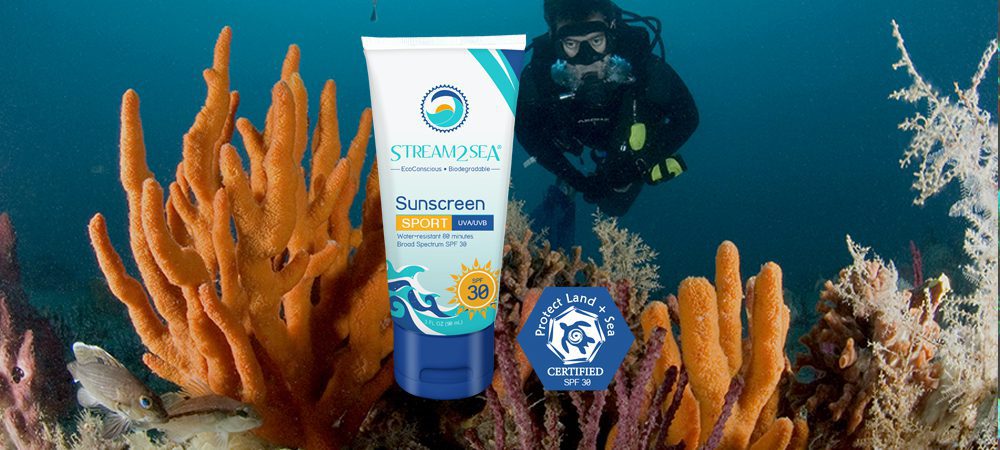 Haereticus Environmental Lab created the Protect Land + Sea (PL+S) certification because selecting a reef-safe sunscreen is more challenging than it should be. HEL is a non-profit, scientific organization whose mission is to conserve wildlife and ecosystems. If a product wears the Protect Land + Sea Certification Seal, consumers, park rangers, and businesses can rest assured that a product does not contain ingredients that may be harmful environmental pollutants.
Haereticus Environmental Lab created the Protect Land + Sea (PL+S) certification because selecting a reef-safe sunscreen is more challenging than it should be. HEL is a non-profit, scientific organization whose mission is to conserve wildlife and ecosystems. If a product wears the Protect Land + Sea Certification Seal, consumers, park rangers, and businesses can rest assured that a product does not contain ingredients that may be harmful environmental pollutants.
Testing on Fish and Coral
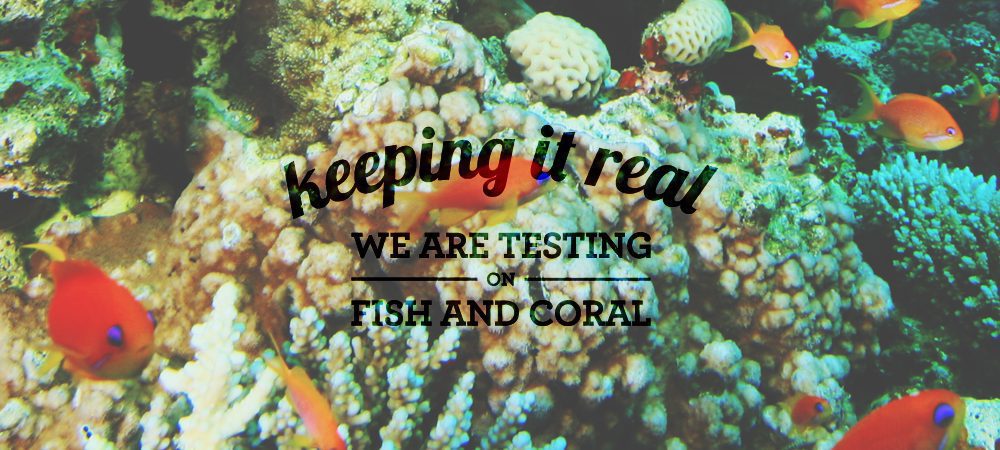 We tested our safe sunscreen products to ensure they will not be harmful to fish and other aquatic life when used as directed. We are adamantly opposed to animal testing when there are other alternatives. At this time, there are no cellular cultures or models that effectively assess aquatic toxicity to the extent that we feel is necessary. Therefore, our testing included the use of purposely bred live fish and EcoConsciously and scientifically obtained coral larvae.
We tested our safe sunscreen products to ensure they will not be harmful to fish and other aquatic life when used as directed. We are adamantly opposed to animal testing when there are other alternatives. At this time, there are no cellular cultures or models that effectively assess aquatic toxicity to the extent that we feel is necessary. Therefore, our testing included the use of purposely bred live fish and EcoConsciously and scientifically obtained coral larvae.
Does Your Sunscreen Contribute to the Destruction of Coral Reefs?
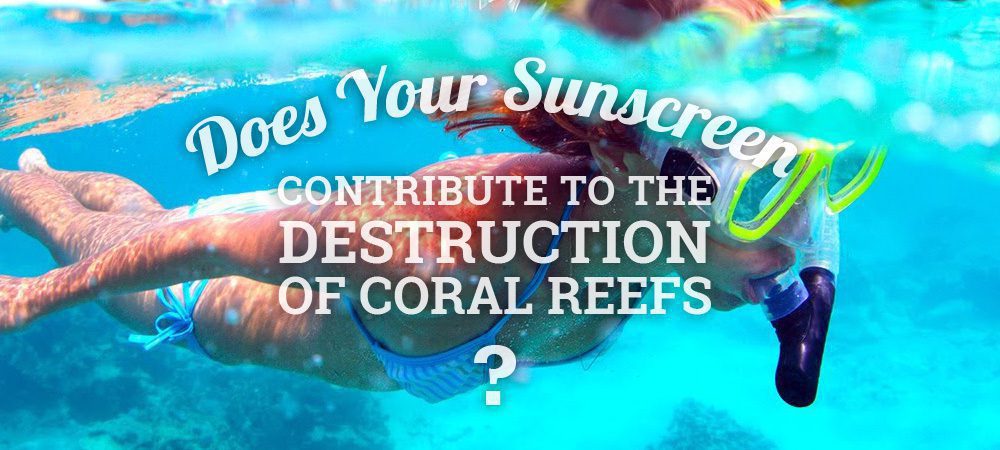 If your sunscreen contains oxybenzone and parabens, they are part of the problem. When the Washington Post and Time magazine both published articles warning about sunscreens killing coral reefs, it didn’t surprise me one bit. The damage caused by benzophenone (also known as oxybenzone) and parabens had already been well documented in previous reports. The really big surprise with this latest research by Dr. Craig Downs, published in the Journal of Environmental Contamination and Toxicology, was that such a tiny concentration could cause such extensive damage.
If your sunscreen contains oxybenzone and parabens, they are part of the problem. When the Washington Post and Time magazine both published articles warning about sunscreens killing coral reefs, it didn’t surprise me one bit. The damage caused by benzophenone (also known as oxybenzone) and parabens had already been well documented in previous reports. The really big surprise with this latest research by Dr. Craig Downs, published in the Journal of Environmental Contamination and Toxicology, was that such a tiny concentration could cause such extensive damage.
The Truth about Coral reef safe
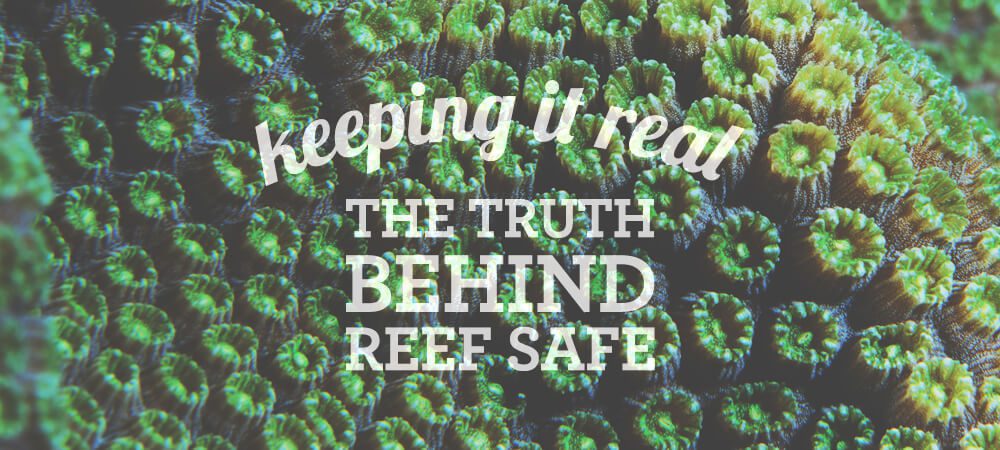 Fact: There are NO official, approved tests or certification for Reef-Safe or Ocean-Safe products. The term coral reef safe implies that it is safe for the entire reef, but how does one know this? You would have to test on things that are not currently testable, or at this point are cost prohibitive to test. We would not put a product on the market that doesn’t pass the most intense testing I can manage, while also meeting my standards for human safety as well.
Fact: There are NO official, approved tests or certification for Reef-Safe or Ocean-Safe products. The term coral reef safe implies that it is safe for the entire reef, but how does one know this? You would have to test on things that are not currently testable, or at this point are cost prohibitive to test. We would not put a product on the market that doesn’t pass the most intense testing I can manage, while also meeting my standards for human safety as well.
View Stream2Sea’s Sunscreens
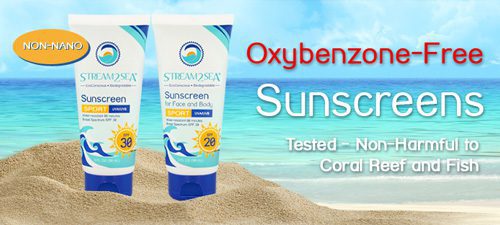 Our biodegradable, mineral sunscreen for face and body is high-performance and mineral-based. It has been rigorously tested for biodegradability and aquatic toxicity. Contains our potent antioxidant blend of Green Tea, Tulsi, Wakame and Olive Leaf.
Our biodegradable, mineral sunscreen for face and body is high-performance and mineral-based. It has been rigorously tested for biodegradability and aquatic toxicity. Contains our potent antioxidant blend of Green Tea, Tulsi, Wakame and Olive Leaf.
About Biodegradable Reef Safe Sunscreens
Our Test Results
Scientific Tests and Resources
- Learn more about our Product Testing
- Here’s a statement of results from Eckerd College studies on on Stream2Sea Sunscreens and all our skincare products.
- A new study measured real concentrations of common chemical sunscreens like oxybenzone in the environment and found there was more than enough present to harm our coral reefs!
- Bay Soundings published an in-depth article about our testing with Eckerd College.
- Protect Land + Sea Certifcation: Stream2Sea SPF30 Sunscreen – the only mineral sunscreen tested not to harm coral larvae – has passed the stringent testing of HEL labs!
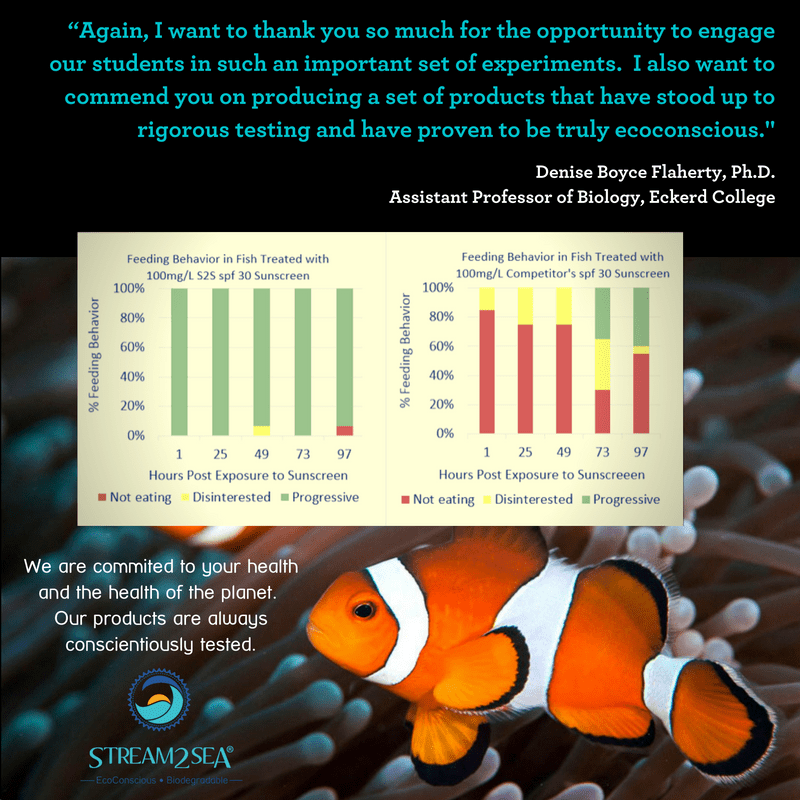
News and Media
- The Guardian “http://www.theguardian.com/environment/2015/oct/21/sunscreen-contributing-to-decline-of-coral-reefs-study-shows“
- EWG Sunscreen Ingredient is Toxic to Coral Reefs
- Huffington Post Sunscreen Could Be Killing The World’s Coral Reefs, Study Says
- TIME How Sunscreen May Be Destroying Coral Reefs